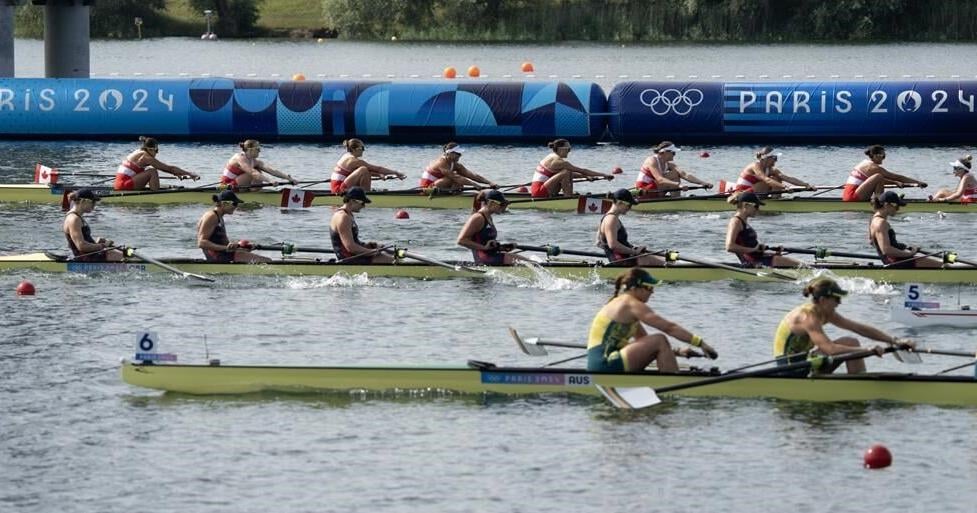PARIS – Summer McIntosh led a pool party for Canada’s swimmers on Day 8 of the Olympics, the country’s most successful at the Games so far.
The 17-year-old phenom from Toronto cemented herself as one of the stars of the Games with her third gold medal in Paris, fending off a competitive field to take gold in the women’s 200-metre individual medley.
Toronto’s Josh Liendo and Montreal’s Ilya Karhun got in on the fun, finishing second and third respectively in the men’s 100 butterfly.
The haul in the pool gave Canada four medals on the day after the women’s eight rowing team took silver early Saturday.
And yet despite the ecstasy, there was also plenty of agony for Canada on Day 8.
There was no silver lining for Damian Warner in his title defence. The Canadian decathlete fell out of medal contention when he hit the bar three times in the pole vault, dropping him from second to 18th with two events to go.
Meanwhile, Montreal’s Felix Auger-Aliassime missed a chance to add a second tennis medal in Paris with a loss to Italy’s Lorenzo Musetti in the men’s singles bronze-medal match. And Canada’s women’s soccer team saw its title defence come to an end with a loss to Germany in the quarterfinals.
Saturday’s medals gave Canada 15 (four gold, four silver, seven bronze) at the halfway point of the Games.
McIntosh won the 200 IM in an Olympic-record time of two minutes 6.56 seconds. She also won the 400-metre medley and the 200-metre butterfly earlier in the Games.
Kate Douglass of the United States was second, and Australia’s Kaylee McKeown third.
McIntosh’s medal was also her fourth in Paris after a silver medal in the 400-metre freestyle to kick off the meet.
“It’s pretty surreal. I’m just so proud of myself and how I’ve been able to recover and manage events,” said McIntosh, who matched swim teammate Penny Oleksiak’s record of four medals at a Summer Games.
“The reason I’m able to do this is just because of all the hard work and dedication I’ve given to this moment, along with all my family and my teammates, and my coaches have also worked so hard for me to be here today.”
In the men’s 100-metre butterfly, Hungary’s Kristof Malik captured gold in 49.90 seconds ahead of Liendo in 49.99 and Kharun in 50.45.
The two became the first Canadian men to reach the podium in the 100 fly since Bruce Robertson’s silver in Munich in 1972. It was the first time two Canadian male swimmers finished in the medals in the same Olympic race.
Day 8 got off to an eventful start for Canadian athletes at the Paris Games.
The rowing silver increased Canada’s streak to eight days on the podium since medals started being awarded after the opening ceremony. Canada’s best opening medal streak is nine days, set at the 2016 Rio Olympics.
The Canadian rowers finished with a time of five minutes 58.84 seconds at Vaires-sur-Marne Nautical Stadium, behind gold medallist Romania which finished in five minutes 54.39 seconds.
Canada found itself in a tight battle with Britain for second with 500 metres to go, but was able to hold off its rival to claim silver.
The Romanian team put on a dominant performance, leading for three-quarters of the race and finishing four seconds in front.
“At the end of the day it was all about belief,” rower Avalon Wasteneys of Campbell River, B.C., said. “We went out on that course and we knew that we were going to give our best possible race we could do, on the day it mattered.”
The Canadian women’s soccer team’s memorable and tumultuous run at the Paris Olympics ended with a 4-2 loss to Germany on penalty kicks following a scoreless draw at Stade de Marseille.
“I can’t quite find the tears. I think I shed them all this week,” defender Vanessa Gilles said following the loss.
Canada, the defending Olympic champions, advanced to the knockout stage in Paris by winning all three pool games despite a hefty six-point penalty imposed by FIFA for a drone spying scandal that marred their campaign.
The discipline came after members of Canada’s coaching staff were caught using drones to spy on New Zealand’s practices before the opening of competition.
The 34-year-old Warner, from London, Ont., was sitting in second in the decathlon with 6,428 points, 72 behind Germany’s Leo Neugebauer, after seven events before failing to score in the pole vault.
Warner was looking to defend his Olympic title from the Tokyo Games in 2021, where he had set an Olympic record with 9,018 points.
Canada had high hopes for another decathlon medal heading into the Paris. But defending world champion Pierce LePage pulled out shortly before the Games began to focus on his recovery from a herniated disc, and Warner’s medal bid ended in heartbreak.
Elsewhere on the track, star sprinter Andre De Grasse of Markham, Ont., moved on to the semifinals of the men’s 100 metres at the Paris Olympics.
De Grasse, who won bronze in the event at the last two Games, finished third in Heat 7 with a time of 10.07 seconds.
Auger-Aliassime fell short of a second bronze medal at the Paris Olympics with a 6-4, 1-6, 6-3 loss to Musetti at Roland Garros.
Auger-Aliassime was trying to claim Canada’s first singles medal at an Olympics. He still will leave the Paris Games with a medal, though, because he teamed with Gabriela Dabrowski to earn the bronze in mixed doubles on Friday.
In gymnastics, Ellie Black of Halifax finished sixth in the women’s vault in what could be her final Olympic event.
Black, competing at her fourth Games, posted an average score of 13.933 over two vaults to finish behind medallists Simone Biles of the United States, Rebeca Andrade of Brazil and Jade Carey of the U.S. Vancouver’s Shallon Olsen was eighth.
This report by The Canadian Press was first published Aug. 3, 2024.

























